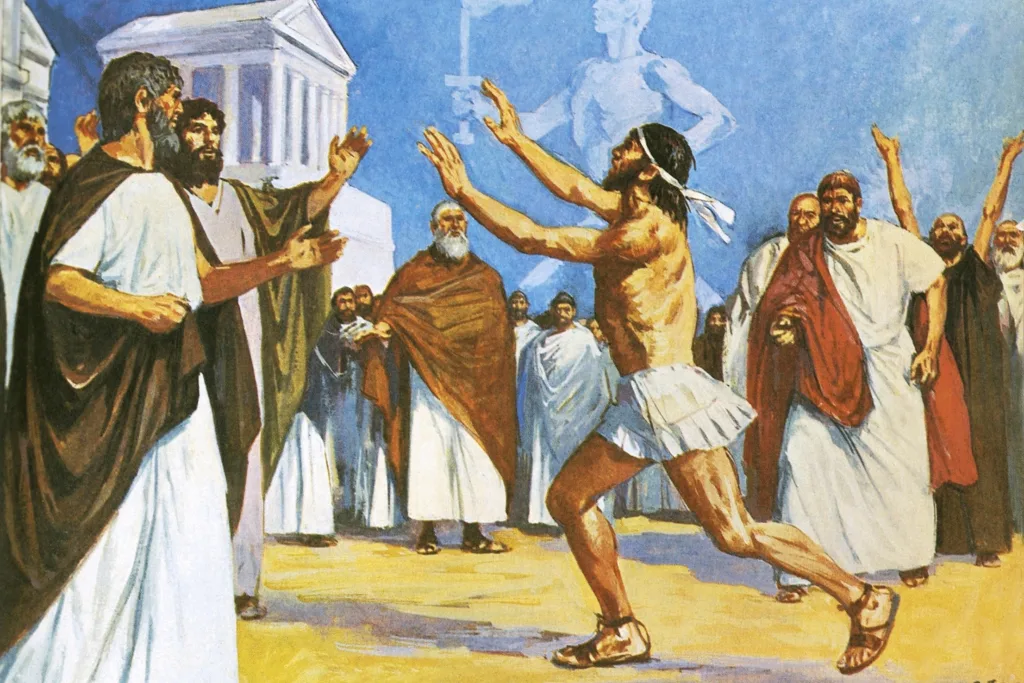In ancient Greece, there lived a man named Pheidippides who would go down in history as a legendary figure. He is most well known for his remarkable feat of running from the battlefield of Marathon to the citadel in Athens to deliver a message of victory. This incredible act of endurance has since inspired the modern-day marathon race.
The story of Pheidippides takes us back to the year 490 BC, during a time when the Persian Empire sought to conquer Greece. The Persians had landed at Marathon, a coastal town near Athens, and engaged in a fierce battle with the Athenian army. Against all odds, the Athenians emerged victorious, dealing a significant blow to the Persian forces.
As soon as the battle concluded, Pheidippides was entrusted with the crucial task of carrying the news of the victory back to Athens. With adrenaline coursing through his veins, he embarked on a non-stop journey that would push the limits of his physical endurance.
The distance from Marathon to Athens was approximately 25 miles, a considerable distance to cover by foot. However, before his famous run, Pheidippides had already undertaken another arduous journey. He had run from Athens to Sparta, a distance of around 140 miles, in a desperate plea for assistance from the Spartan troops against the Persian invaders.
Having successfully convinced the Spartans to join forces with the Athenians, Pheidippides now had to make the return journey to Athens to deliver the news of their victory. With a sense of urgency and determination, he pushed himself to the limit, running tirelessly through rugged terrain, battling exhaustion and the pain in his feet.
As he reached the citadel in Athens, Pheidippides shouted out the words that would bring joy and relief to the Athenians: “Joy to you, we’ve won!” With those words, he collapsed, his body unable to bear the immense strain it had endured. Pheidippides had fulfilled his duty, but at a great cost – he had given his life for his city and his people.
It is worth noting that the story of Pheidippides’ run from Marathon to Athens has been passed down through the ages, and there are variations in the details. Some accounts suggest that he ran the entire distance without stopping, while others claim he paused briefly to deliver the news to the Athenian generals before collapsing.
Regardless of the exact details, Pheidippides’ extraordinary act of endurance has become the inspiration for the modern marathon race. The distance of the marathon, 26.2 miles, approximates the distance Pheidippides is believed to have run. Today, thousands of runners from around the world take part in marathons, testing their own limits and paying homage to the ancient Greek hero.
Pheidippides was a Greek messenger who played a pivotal role in delivering the news of the Athenian victory at Marathon. His legendary run from the battlefield to Athens, and his subsequent collapse, have immortalized his name in history. Pheidippides’ story continues to inspire and captivate, reminding us of the incredible feats that human beings are capable of achieving in the face of adversity.
Who Is Pheidippides And What Was He Known For?
Pheidippides was a prominent figure in ancient Greece, renowned for his legendary act of delivering a pivotal message from the battlefield of Marathon to the city of Athens in 490 BC. He is primarily known for his feat of running non-stop from Marathon to Athens, covering a distance of approximately 26 miles or 42 kilometers.
Pheidippides’ mission was to inform the Athenians of the Athenian army’s triumph over the Persians in the Battle of Marathon. This victory played a significant role in preventing the Persian invasion of Greece. The exact details of this historic event have been debated, but according to the ancient historian Herodotus, Pheidippides was chosen as the messenger due to his exceptional running abilities.
The purpose of Pheidippides’ run was to deliver the news of victory to the Athenian leaders, urging them to prepare for a potential Persian naval assault on Athens. The distance between Marathon and Athens required immense endurance and speed, which Pheidippides demonstrated by completing the run without stopping.
The story of Pheidippides’ run gained even more fame when the British poet Robert Browning wrote a dramatic poem titled “Pheidippides” in 1879, which romanticized the event. However, it is important to note that the details of Pheidippides’ run and his subsequent death are not entirely clear from historical sources. Some accounts suggest that he collapsed and died immediately after delivering the message, while others indicate that he survived for a short period before perishing.
Regardless of the exact details, Pheidippides’ run from Marathon to Athens has become an enduring symbol of endurance, determination, and the spirit of victory. Today, the marathon race, which covers a distance of 26.2 miles, is a popular athletic event commemorating Pheidippides’ historic feat.

What Happened To Pheidippides?
After delivering the news of the Athenian victory at the Battle of Marathon, Pheidippides, the Greek messenger, unfortunately collapsed and died. The exact cause of his death is uncertain, as there are different accounts of what happened to him after his arrival in Athens.
According to the historian Herodotus, Pheidippides was sent from Marathon to Athens to request military support before the battle. After the Athenian victory, he was then sent back to Athens to deliver the news of the triumph. Herodotus does not explicitly mention Pheidippides’ death in his writings, leading some to speculate that he survived the journey.
Another account by the Greek writer Lucian suggests that Pheidippides died immediately after delivering his message. Lucian describes Pheidippides bursting into the assembly, exclaiming “Rejoice, we conquer!” before collapsing and dying.
Regardless of the specific details, it is generally accepted that Pheidippides met his demise shortly after completing his mission. The exact cause of his death is often attributed to exhaustion, as he had just run approximately 25 miles (or 40 kilometers) from Marathon to Athens at great speed.
It is important to note that while Pheidippides’ run from Marathon to Athens is legendary and has become the basis for the modern marathon race, the exact historical accuracy of the events is debated among scholars. Nevertheless, the story of Pheidippides’ heroic run and his unfortunate fate has captured the imagination and has become an integral part of the marathon mythos.
What Did Pheidippides Say Before He Died?
According to Herodotus, Pheidippides, the ancient Greek messenger, is believed to have uttered his last words before his death. As he arrived at his destination, his initial words were filled with joy and victory, as he exclaimed, “Joy to you, we’ve won!” These words likely conveyed the news of a successful outcome or victory to the person or group he encountered upon his arrival.
However, shortly after expressing his jubilation, Pheidippides would have experienced extreme physical exhaustion. It is said that his next words, though not explicitly documented, would have likely conveyed his immense pain and fatigue. One can imagine him expressing something along the lines of, “My feet are killing me!” or “I can’t go on any longer!”
Pheidippides’ intense physical exertion, combined with the demands of his long-distance run, ultimately took its toll on his body. It is believed that he collapsed and died shortly after delivering his message. The strain on his feet and body from the arduous journey proved to be too much for him to bear, leading to his untimely demise.
Pheidippides’ last words, as reported by Herodotus, were filled with both triumph and physical agony. His initial exclamation of victory was followed by a lamentation of his excruciating pain, highlighting the immense toll his run had taken on his body.
What Did Pheidippides Do For Athens?
Pheidippides played a crucial role in the defense of Athens during the Persian Wars. His primary task was to seek assistance from the Spartans, who were renowned for their military prowess, to aid the Athenians in their battle against the invading Persian forces. Here is a breakdown of Pheidippides’ contributions to Athens:
1. Journey to Sparta: Pheidippides embarked on a long and arduous journey from Athens to Sparta, covering a distance of approximately 140 miles. His purpose was to urgently request military support from the Spartans, who were known for their formidable army. This journey involved traversing challenging terrains and enduring physical hardships.
2. Diplomatic Mission: Pheidippides was essentially acting as an envoy for Athens, carrying an urgent message requesting the Spartans’ assistance. This diplomatic mission aimed to unite the Greek city-states against the Persian invaders and rally support for the Athenian cause.
3. Communication of the Threat: Pheidippides’ mission was particularly crucial because he needed to convey the gravity of the Persian threat to the Spartans. He had to emphasize the imminent danger faced by Athens and the need for immediate action to protect Greek territories.
4. Symbolic Significance: Pheidippides’ journey to Sparta served as a symbolic act of loyalty and determination. By undertaking such a demanding task, he demonstrated his commitment to defending Athens and the Greek way of life. This act also highlighted the unity and cooperation among Greek city-states in times of crisis.
5. Mobilizing Spartans: Pheidippides’ ultimate goal was to convince the Spartans to join forces with the Athenians in the upcoming battle against the Persians. By securing the support of the Spartans, Athens could strengthen its military capabilities and increase the chances of defeating the Persian army.
Pheidippides’ journey to Sparta played a vital role in securing crucial military assistance for Athens during the Persian Wars. His bravery, endurance, and diplomatic skills were instrumental in forming a united Greek front against the invading Persian forces.

Conclusion
Pheidippides was a remarkable figure in ancient Greece, known for his legendary run from the battlefield of Marathon to Athens to deliver news of the Athenian army’s victory over the Persians. According to historical accounts, Pheidippides also embarked on a prior journey from Athens to Sparta to seek assistance from the Spartans in the battle against the Persians. His dedication and endurance during these runs showcased his commitment to his city-state and his willingness to go to great lengths to ensure victory. While the exact details of Pheidippides’ feat may be debated, his story has become synonymous with the origins of the marathon race, inspiring countless athletes throughout history. Regardless of the historical accuracy of the events surrounding Pheidippides, his name and legacy continue to be associated with incredible endurance and determination.
